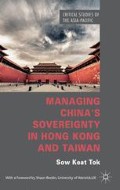Abstract
The previous two chapters were dedicated to the discussions of sovereignty discourses within Mainland China’s academic (Chapter 3) and political (Chapter 4) circles. The most important finding in the chapters is the conceptual separation of sovereignty from right of governance, in the sense that from the viewpoint of the Chinese, sovereignty takes more of a de jure meaning and Beijing’s right of governance is not considered a necessary component of the sovereign whole. While this unique conception does not theoretically divide sovereignty per se, it again questions if the Chinese still see sovereignty as absolute, “Victorian,” or “inalienable.” Furthermore, in the last chapter, it was discovered that China’s sovereignty, at the discourse level, places Hong Kong and Macao on different levels. In contrast, Taiwan is given more leeway than Hong Kong in terms of the way Chinese sovereignty is upheld whether in spoken or imagined terms. From the words in public documents and leadership doctrines, how sovereignty actually manifests itself in Hong Kong and Taiwan appears the lesser issue compared to the maintenance of a unified de jure sovereign entity centred upon Beijing.
Access this chapter
Tax calculation will be finalised at checkout
Purchases are for personal use only
Preview
Unable to display preview. Download preview PDF.
Notes
See, for example, the works of numerous academics like those who have contributed to Joseph Cheng’s (2001) edited volume Political Development in the HKSAR, among others. This book makes no attempts whatsoever to discredit these works, as it is admittedly far easier for the author of this book to appreciate the situation in the HKSAR from the other side (the Mainland’s side) of the story than one who has lived through Hong Kong’s unique political and social conditions from the 1970s right through the 1990s, and would like to maintain the view of glass half-filled rather than half-empty, given similar narratives of events that had happened in the HKSAR (see Roberts, 1996; and a collection of interesting narratives from Hong Kong’s students in Chai, 1998; Lam, J., 2001).
The same observation was raised by another commentator, but with a more cynical twist, as he deemed “the new order (in HKSAR under Chinese rule), so keen to remove symbols of the past, has been equally keen to restore the past in the shape of recreating an abandoned form of colonial government” and that “(a)fter a century and a half of British colonial rule, China has acquired a new colony.” Vines (1999 and 1998).
Author information
Authors and Affiliations
Copyright information
© 2013 Sow Keat Tok
About this chapter
Cite this chapter
Tok, S.K. (2013). Accommodating Two Governances under One Sovereignty: The HKSAR’s Domestic Spheres and International Space. In: Managing China’s Sovereignty in Hong Kong and Taiwan. Critical Studies of the Asia Pacific Series. Palgrave Macmillan, London. https://doi.org/10.1057/9781137263841_5
Download citation
DOI: https://doi.org/10.1057/9781137263841_5
Publisher Name: Palgrave Macmillan, London
Print ISBN: 978-1-349-44279-9
Online ISBN: 978-1-137-26384-1
eBook Packages: Palgrave Political & Intern. Studies CollectionPolitical Science and International Studies (R0)

